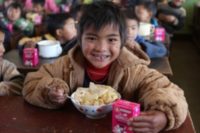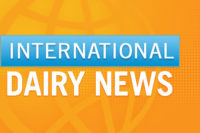Opportunities abroad
As China's dairy market gets fierce, domestic products still lag
Wen’s Dairy has commissioned a new processing plant in the Pearl River delta.

Photo for Dairy Foods by Vito Palmisano
[Editor’s note: the following report was submitted by CCM, a Hong Kong-based analyst.]
China’s dairy market is getting more competitive, as further enterprises are paying attention to the downstream markets. However, Chinese consumers still prefer imported products over domestically produced ones, due to the lack of confidence and price advantages.
China’s dairy processing market will be intensified with the appearance of a new player in South China. Wen’s Dairy has commissioned a new processing plant in one of China’s economic hearts: the Pearl River delta. The company aims to produce 80,000 tons of dairy products yearly in the new facility.
The enterprise is known to be the main supplier of raw milk to most Hong Kong dairy manufacturers as well as enterprises in China’s south. However, in 2016 the company has changed from being a raw milk supplier to a dairy product processor itself, producing several dairy products like cheese and yogurt.
In its 2016 financial report, Wen’s Dairy noted that it will speed up the development of its dairy processing business in 2017 and improve its brand awareness and competitiveness. The level of competition in the dairy markets of Guangdong Province and South China is becoming fiercer as Wen’s Dairy turns its attention to the downstream markets.
Nevertheless, domestic dairy products are still facing a disadvantage against imported ones, mainly due to the lack of consumers’ trust as well as price competitiveness.
Long-term effects of China’s dairy products scandal
Several scandals on China’s dairy products, like the famous melanin scandal in 2007, are still in the consciousness of many consumers, who only slowly started buying domestic products again. In addition to that, the trend of ordering dairy products online on overseas websites and having them delivered by so-called daigous is becoming more popular, since the price of overseas dairy products is still lower than domestic ones.
According to the Chinese food and drug administration, the quality and safety of domestic dairy products have greatly improved, as monthly sample inspections are demonstrating. In fact, the proportion of approved samples by the administration has surpassed 99% in 2017.
As to procurement of dairy ingredients, big producers tend to import directly from overseas producers, such as Synutra whose milk powder is 100% imported from Fonterra and Euroserum SAS, or at the same time building their own milk power plants overseas like Ausnutria. Small producers tend to import through distributors or purchase from domestic suppliers.
What’s more, the General Administration of Quality Supervision in China is also getting stricter on imported overseas dairy products. A recently revealed list shows 28.9 tons of rejected dairy products trying to enter the Chinese market. The list mainly contains whipping cream and cheese from European countries like France, the Netherlands and Germany.
Looking for a reprint of this article?
From high-res PDFs to custom plaques, order your copy today!





